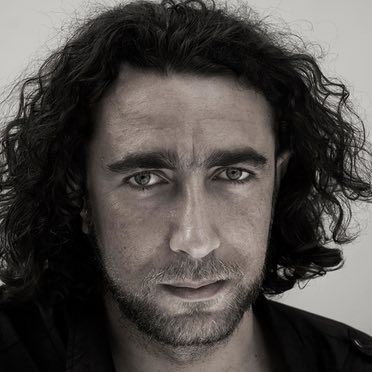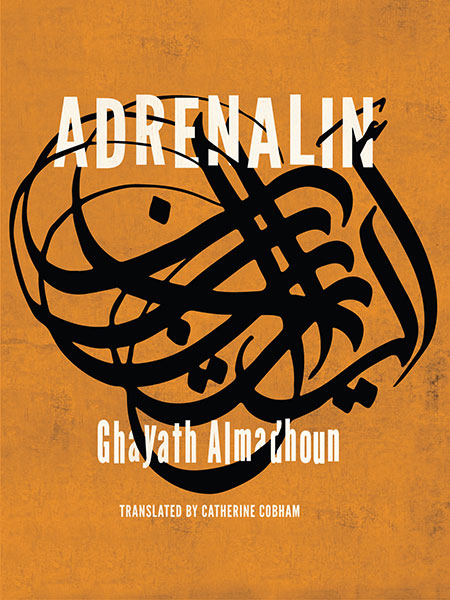
Johannes Göransson: You seem to be constantly on the move. One minute you’re in Stockholm, the next you’re reading at a book festival in the Middle East, and then you’re in Berlin. This constant movement has been a constant in your life—a Palestinian poet born in Syria, who later migrated to Stockholm to get away from the dictatorship in Syria. Where were you when you wrote the poems in your first book Adrenaline? How does place affect your poems? How does movement affect it?
Ghayath Almadhoun: My poems revolve around my memories and nightmares, and the background is often the cities, the cities are the main bearer of my texts, I think as an Arab poet, I still carry in me the Bedouin who prefers freedom over roots, a nomad moving between cities as easily as a knife in the flesh, smooth, but it leaves a deep impact that could be fatal.
Escaping instead of facing tragedies is a proactive therapy I highly recommend for writers in catastrophic times, it is a typical escaping forward, but it is a very successful way to postponing trauma instead of facing it, running away instead of confronting, I believe that we get PTSD when we settle, so I strive to be “on the road” all the time, to not arrive.
It is also a successful way to ensure that the tragedy’s poisonous does not infiltrate literature, or what I call: The Literary Sadfishing Syndrome, where the literary text turns into a sentimental statement evokes emotion and sympathy towards the horror of the event, not the quality of the text, which is happening frequently in-between writers who escape catastrophe.
JG: A question about a different kind of boundary-traversal: Lately you’ve worked a lot with multimedia and film—winning an award for Évian at the Berlin’s ZEBRA Poetry Film Festival. Can you talk about your interest in multimedia mutations of poetry?
GA: I am not a filmmaker in the traditional sense, nor do I want to be. All I discovered was a new way to spread poetry, in addition to publishing in literary books, magazines, reading at festivals, and literary evenings.
JG: The poems you sent me the other day both have footnotes—as do some of the poems in Adrenalin. What interests you about footnotes? To me they seem almost generated by the experience of translation—the sense that translation often opens us this desire to explain, give the back story to something (a word, an image, a name). But it also seems in a way to have something to do with your interest in multi-media poetry—the footnotes breaking the supposed coherence and “wellwroughtness” of the lyric. Can you talk about this interest in footnotes?
GA: Margins are more valuable than centers to me. I’m fascinated by making the footnotes as poetic as the poem, also to let them be more important than the main text, or at least, make them the keywords to understand the whole work.
I’m very allergic to centers in general, maybe because I came from an occupied homeland where there is a center and margin, I don’t know really what the fuck is going on while I’m writing, but I think that the Palestinians are the margins of the story.
Also, I was fascinated by the margins and notes the Arab philosophers had put on Greek philosophy. Greek philosophy reached Europe by translating from Arabic, and Arab philosophers had put many margins and notes through their study of Greek philosophy, which reached Europe and was later obscured by Orientalism.
JG: The Chilean poet Raúl Zurita is fond of saying: “You can’t defeat a dictatorship with poetry, but without poetry, and this is no metaphor, humanity disappears, literally, in the next five minutes.” In the US there’s currently a lot of poets who express an impatience with the lyric poem, arguing that the times are so catastrophic that there’s no space for “the poetic.” Your poems tend to deal with catastrophe, but you like to point out that you don’t write “political poetry,” you are merely writing about your life. What place do you see for poetry when it comes to engaging with catastrophe? Why do you keep writing poetry?
GA: I deal with my life, there is a tragic and diasporic part that came from my Palestinian side, a catastrophic and expectancy part related to the Syrian side, a peaceful and problematic part that came from the Swedish side, an experimental and nomadic part from the German side.
When my poems look political, it’s because of the honesty in my poems, I write the things I feel, also, my vocabulary is very connected to my life, it ended up with me using words from the dictionary of war to write a love poem, maybe it is a shelter to protect me from trauma, and maybe this is what the trauma looks like.
JG: What are you working on these days? What are some of the books you’re reading?
GA: I’m trying to finish my fifth poetry book and I read anything I find, everything is strange. Fuck COVID-19.

Photo Credit: Cato Lein
